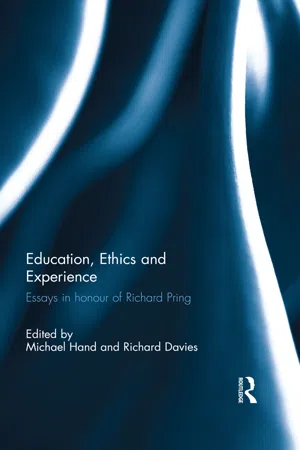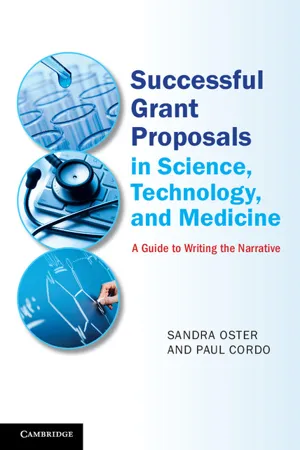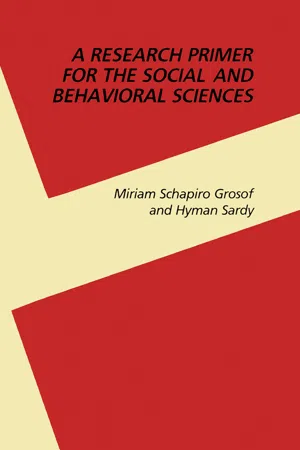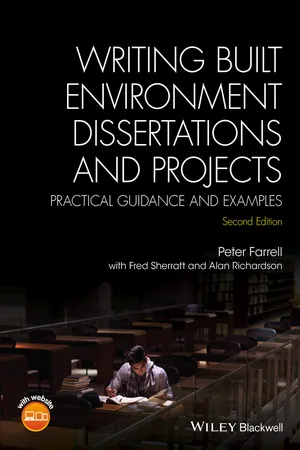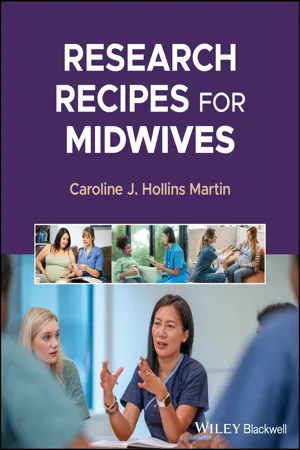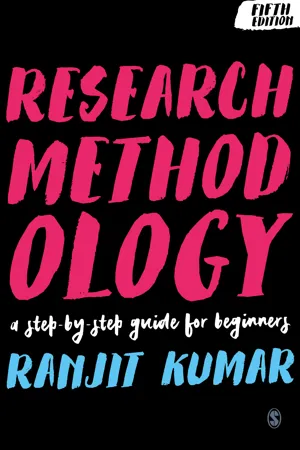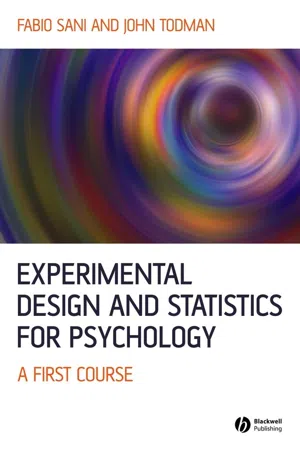Psychology
Aims and Hypotheses
Aims in psychology refer to the specific goals or purposes of a research study, outlining what the researcher hopes to achieve. Hypotheses, on the other hand, are specific, testable predictions about the relationship between variables in a study. Aims guide the overall direction of the research, while hypotheses provide a framework for testing specific predictions.
Written by Perlego with AI-assistance
Related key terms
1 of 5
7 Key excerpts on "Aims and Hypotheses"
- eBook - ePub
Education, Ethics and Experience
Essays in honour of Richard Pring
- Michael Hand, Richard Davies(Authors)
- 2015(Publication Date)
- Routledge(Publisher)
i’) but stop short of anticipating the outcomes and the nature of the claims to be made on the basis of the evidence so gathered. A lack of clarity about aims and claims in research reports hinders the ability of readers to judge their quality and relevance.An intention of this chapter is to remind readers not only that the pursuit of any kind of research aim is fraught with philosophical and practical difficulties, but also that the articulation and discussion of these difficulties are far from common practice in the reporting of empirical educational research. This may be one source of the disputes about its quality, trustworthiness and relevance. Another intention is to suggest that these difficulties need not discourage researchers from aspiring towards coherence of their aims, warrants and claims. The discussion will engage with arguments from recent work by Richard Pring (Pring, 2015 , 2012 , 2007 ; Oancea and Pring, 2008 ).Aims, research questions and claims of research
Oancea and Pring, following Stenhouse, define research as ‘the systematic gathering of evidence … or indeed (as in philosophical research) the systematic analysis of the conceptual framework within which that evidence is gathered, with a view to answering certain questions’ (Oancea and Pring, 2008 , p.23; Stenhouse, 1975 ). Any answers generated are subject to constant challenge and refinement. Empirical research questions arise from initial states of epistemic perplexity, puzzlement, doubt or wonder, but also from practical problems and normative conflicts, as well as from existential experiences such as repression, despair or anxiety. In other words, as I have argued elsewhere (Oancea, 2011 ), they arise from the same ‘source experiences’ as philosophical inquiry; but this insight is often lost as empirical (a posteriori) and philosophical-conceptual (a priori - eBook - PDF
Successful Grant Proposals in Science, Technology, and Medicine
A Guide to Writing the Narrative
- Sandra Oster, Paul Cordo(Authors)
- 2015(Publication Date)
- Cambridge University Press(Publisher)
pursue a mechanistic issue is trivial. 6 Descriptive and applied studies arguably might not have hypotheses. 7 A hypothesis, when presented in Passage 1 of the Aims Section, is the primary claim that you expect to confirm 8 by investigating your proposed aims. This hypothesis is termed the major hypothesis. A minor hypothesis relates to a particular aim and so is identified in an aims paragraph. However, if you present a minor hypothesis in one of the aims paragraphs, reviewers sometimes expect each of the aims paragraphs to offer a minor hypothesis. Guideline 2.6 If you include a minor hypothesis in an aims paragraph, consider including a minor hypothesis in each aims paragraph. As illustrated in Examples 18, 19, and 20a, a hypothesis has 2 necessary components: an identifier and a claim. Example 18 We hypothesize that Rac1 activation is regulated by the mTOR/S6K1 signaling pathway in platelets. Example 19 Our hypothesis is that chronic unilateral peripheral vestibular loss results in persistent central vestibular asymmetries. Example 20 a. We hypothesize that the song-induced expression of zenk in the NCM, an early component of a regulatory cascade, leads to long-lasting modifications of NCM neurons. b. ‡It is hypothesized that NsrR-dependent regulation and the dual . . . Both the identifier and the claim are required in a hypothesis. The identifier labels the claim (a speculation) as a hypothesis in a verb (hypothesize) or noun (hypothesis) form. It is this identifier that distinguishes the hypothesis from other types of analysis statements. The verb in the identifier is in the present tense since the hypothesis is current to the proposed research. A hypothesis is not identified with an impersonal It is hypothesized (see Example 20b) since this passive phrasing does not identify who is performing the mental exercise of hypothesizing. 6 As Ogden and Goldberg note, “Important hypotheses relate to basic mechanisms, the understanding of which advances science. - Miriam Schapiro Grosof, Hyman Sardy(Authors)
- 2014(Publication Date)
- Academic Press(Publisher)
The Hypothesis: What Is It? The purpose of hypotheses is to direct inquiry; observations must support or refute some assertion if they are to be scientifically useful. 13 Properly 70 4. Definitions and Major Research Hypotheses formulated hypotheses guide investigation, motivate design, and suggest interpretations of the findings. Beveridge (1950), Medawar (1979) and Sidman (1960) emphasize the need for flexibility and adaptability on the part of the researcher, the value of data snooping, and the importance of serendipity and the fortuitous juxtaposition of events: they would allow, as in formulative and some taxonomic studies, the generation of hypotheses after inspection of the data, as a goal rather than a guide. We agree that explanation and pattern recognition are enterprises of great value, challenging the imagination of the researcher and providing new insights for further analysis. The use of techniques such as those developed and explicated by Tukey (1977) and Ehrenberg (1982) complement or supplement, but do not replace, conventional hypothesis testing. Most authors of research manuals in the social and behavioral sciences stress the value of precise hypotheses, explicitly and formally stated in advance of data collection and certainly in advance of any inspection of the data. 14 They appear to agree that If an explanation cannot be formulated in the form of a testable hypothesis, then it can be considered to be a metaphysical explanation and thus not amenable to scientific investigation. 15 In practice, most researchers find that hypotheses need to be modified as procedures for sampling, measuring, and analysis are tried out and debugged. Both experimental and nonexperimental (e.g., survey) studies often proceed without specifically stated hypotheses (let alone a proposed causal order!).- eBook - ePub
Writing Built Environment Dissertations and Projects
Practical Guidance and Examples
- Peter Farrell, Fred Sherratt, Alan Richardson(Authors)
- 2016(Publication Date)
- Wiley-Blackwell(Publisher)
2 . Consider the ground to be your description of the research problem, which is the result of many iterations and discussions with practitioners. Stemming from the problem description are some provisional research questions. Placed on the sand are four huge stone plinths acting as pads to support the columns; they are analogous to the literature review supporting what follows. On completion of the literature review, you will then reaffirm or develop your research questions or goals. This is done by erecting the four tall columns, each of which comprises three pieces of stone 5 m high placed carefully upon each other. The first stone for each column represents a research question, the second piece an objective as a statement of what you will ‘do’ to answer the research question and finally a hypothesis that you will test, again to allow you to answer the research question. There are thus, four research questions/objectives/hypotheses shown. The roof parapet is pitched, representing your aim; the four columns support the roof in the same way that your research goals support your aim. The ridge on the roof parapet is the point of your aim, driving forward your research and giving you direction. Inside or behind your columns, the door and windows are further openings into your research; the variables and their definitions, give you the possibility of attaining better marks. Weaknesses in this structure will cause your research to fail; poorly defined problem or failure to network and circulate (loose, not dense sand), missing important literature (no pad foundations), wobbly or weak objectives (columns defective or not plumb), forgetting your variables (no doors or windows), misdirected aim. In the case of research, you will write a provisional aim, or design the roof, before you form the foundations or start to write about the problem. There is lots of work to be done later to clad the structure and ensure that the research is watertight: sound methodology, reliability and validity, appropriate data collection and robust analysis, strong discussion and conclusions and so on.Health and safety is used in section 4.20 to illustrate exemplar aims, research questions, objectives and hypotheses. These are based on recommendations arising from the work of Arewa (2013), which is more fully described in appendix D6.4.2 Aim
The aim is the ultimate goal of the study; it is visionary and a statement at a strategic level. The introduction to the document will often start by saying ‘The aim of this study is to investigate…’ The aim will identify the context of what is to be attempted; what field are you in? If the aim is carefully written at the outset, it should not change from beginning to end. If you reflect at some later stage of the process that the words used in the aim are not sufficiently succinct, by all means change them but try and do it without altering in your own mind the strategic direction of your research. The aim will give you direction for your objectives, and if objectives change at the early stages of a study, they should remain within the remit of the aim. The aim can be written without consideration of resource limits. Resources will always limit researchers, particularly personal time, and therefore research should not be judged on the yardstick of the aim. Aims will not be achieved. Small studies have one aim. There are analogies with business: mission statements of companies express aims, designed in boardrooms by directors or partners. Objectives are statements at an operational level. They support the mission statement in a business sense, or support the aim in the sense of a dissertation or project. The operational level is a level below the boardroom; that is, managers who are closer to the ‘shop floor’. - eBook - PDF
- Caroline J. Hollins Martin(Author)
- 2023(Publication Date)
- Wiley-Blackwell(Publisher)
All of these are in front of the (x) Methods section (STEP 7–11), which will be discussed in the subsequent chapters. A crucial task in any research proposal is clearly defining the goals of your pro- posed research study. In other words, what area does the study precisely intend to address, and why? To capture this, 4.1 What is an Objective? 4.2 What is an Aim? 4.3 What is a Research Question? 4.4 What is a Hypothesis? 4.5 What is a Null Hypothesis? 4.6 Relationship Between the Null Hypothesis and the Thesis Statement 4.7 The Methods Section of the Research Proposal Will Follow 4.8 Self-Assessment Questions (SAQs) STEP (6): State the objectives, aim(s), research question(s), sub-question(s), hypotheses, and null hypotheses of the proposed research study. 74 CHAPTER 4 Stating the Objectives, Aim(s), Research Question(s), Sub-Question(s), Hypotheses, and Null Hypotheses Chapter Four outlines the process of defining the objectives, aim(s), research question(s), sub-question(s), and hypotheses/ null hypotheses (if a quantitative study). 4.1 WHAT IS AN OBJECTIVE? The objective(s) describe what the researcher expects to achieve by carrying out the research study. In essence, its purpose. The objectives define the direction and content of the investigation yet to be conducted. Without written objectives, the research proposal will be in disarray, akin to a builder with no plans to build a house. Hence, the researcher must be clear about what they intend to achieve from conducting their research study. The best objectives are written in a SMART format (Doran 1981). Specific: Your objectives should be clearly written, with no room for confusion. Keep them narrow and focused. Measurable: Make your objectives measurable, so you can gauge your progress. Achievable: Create objectives that are realistically achievable, with a budget and resources to make this possible. Relevant: Make your objectives relevant to what you want to achieve. - eBook - ePub
Research Methodology
A Step-by-Step Guide for Beginners
- Ranjit Kumar(Author)
- 2018(Publication Date)
- SAGE Publications(Publisher)
Black and Champion (1976: 126) define a hypothesis as ‘a tentative statement about something, the validity of which is usually unknown’. In another definition, Bailey (1978: 35) defines a hypothesis as:According to Grinnell (1988: 200):a proposition that is stated in a testable form and that predicts a particular relationship between two (or more) variables. In other words, if we think that a relationship exists, we first state it as a hypothesis and then test the hypothesis in the field.A hypothesis is written in such a way that it can be proven or disproven by valid and reliable data – it is in order to obtain these data that we perform our study.From the above definitions it is apparent that a hypothesis has certain characteristics:- It is a tentative proposition.
- Its validity is unknown.
- In most cases, it specifies a relationship between two or more variables.
The functions of a hypothesis
While some researchers believe that to conduct a study requires a hypothesis, having a hypothesis is not essential, as already mentioned. However, a hypothesis is important in terms of bringing clarity to the research problem. Specifically, a hypothesis serves the following functions:- The formulation of a hypothesis forces you to precisely specify what you want to find out about, thus bringing specificity and clarity to your study.
- The specificity and clarity needed to construct a hypothesis ensure you only collect the information you need, thereby providing focus to the study. This also enhances the validity of your study as it ensures you are measuring what you set out to measure.
- eBook - PDF
Experimental Design and Statistics for Psychology
A First Course
- Fabio Sani, John Todman(Authors)
- 2008(Publication Date)
- Wiley-Blackwell(Publisher)
In fact, it makes no claims con-cerning which thing causes which: it does not say that a change in self-esteem causes changes in the salary, nor the other way around. This hypothesis simply states that two things (self-esteem and salary) will change together: if one is high, the other one will also be high. In sum, in some cases a hypothesis may be a formal statement in which it is predicted that a specific change in one thing will be associated with a specific change in another thing. In this book we focus on hypotheses that a change in one thing will produce a change in another thing, because the book is mainly devoted to experiments, and the hypotheses that are tested through experiments are of this kind. Hypotheses in which it is predicted that two things change together are generally tested by means of non-experimental studies, and will be dealt with in Chapter 10. Remember that a good hypothesis should be expressed in terms that are precise and clearly defined, and should be parsimonious, that is, as simple as possible. This will make it easier for you to set up a study by means of which your hypothesis is tested. Testing hypotheses Testing a hypothesis implies devising a study by means of which you can provide convincing evidence that the hypothesis is correct. To be truly convincing, the evid-ence you will produce must be empirical evidence , that is, it must be observable by other people – not just you! SCIENTIFIC PSYCHOLOGY AND THE RESEARCH PROCESS 6 Empirical evidence supporting a postulated causal relation between things can be gathered through the use of various techniques. For instance, you could rely on the systematic observation of behaviour. This is what psychologists who are interested in animal behaviour tend to do. Basically, animal psychologists go where the animals live, or create an artificial environment in which animals are placed, and then they observe and record animals’ behaviour through the use of established procedures.
Index pages curate the most relevant extracts from our library of academic textbooks. They’ve been created using an in-house natural language model (NLM), each adding context and meaning to key research topics.
